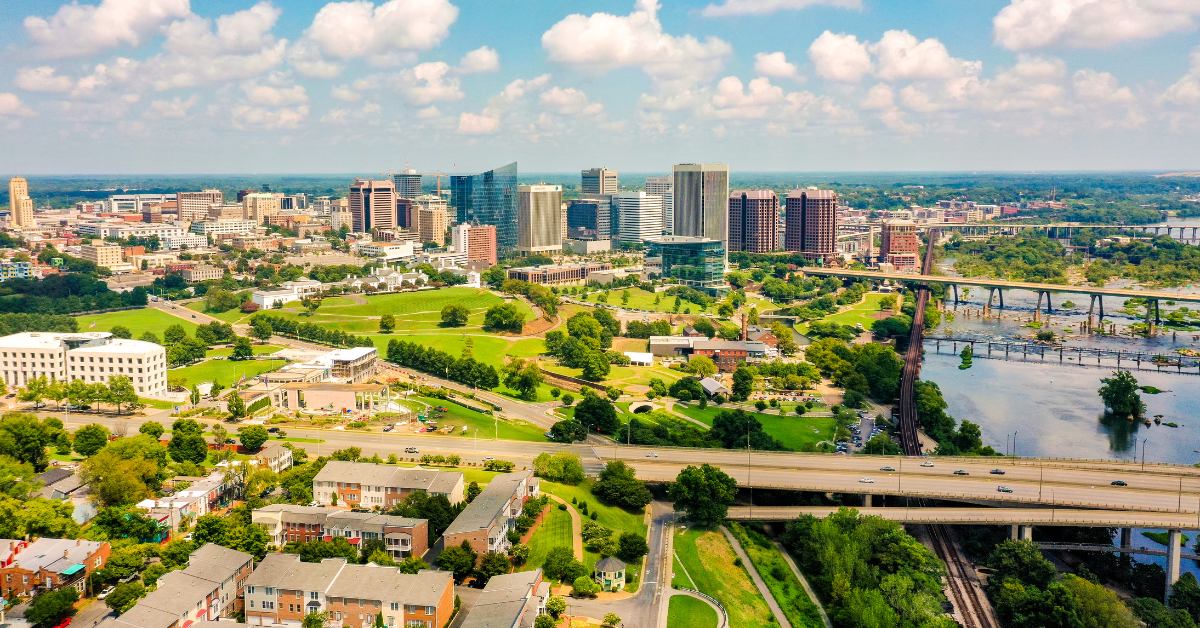Located in the heart of the American South, Richmond is the capital of Virginia where history and culture live in harmony. In recent years, it has gained recognition as a city of education and sports, offering a calm atmosphere and an intellectual spirit. To Japanese visitors, Richmond represents both “old America’s elegance” and “a modern city of learning.”
Why Richmond Has No Kanji Representation
The city name Richmond has no standard kanji form. In Japanese, foreign place names are typically written in katakana, which conveys the sound of the original word. Across newspapers, maps, and news broadcasts, the city’s name consistently appears as “リッチモンド.”
This follows Japan’s convention for standardizing foreign names, which prevents confusion or mispronunciation. In the past, during the Meiji and early Showa periods, some Western place names were written in kanji — for example, Paris as 巴里 or London as 倫敦. However, katakana has since become the standard due to globalization and linguistic clarity.
| Period | Naming Tendency | Example |
|---|---|---|
| Meiji–Early Showa | Use of kanji approximations | 巴里 (Paris), 倫敦 (London) |
| Postwar–Modern | Spread of katakana | リッチモンド (Richmond), ワシントン (Washington) |
| Current | Emphasis on phonetic accuracy | Katakana-only writing |
Using kanji can restrict meaning and distort nuance. Thus, Richmond is represented phonetically in Japanese, preserving its sound and cultural identity without unnecessary interpretation.
The Origin and Background of “Richmond”
The name Richmond originates from Richmond upon Thames, a district in London, England. Derived from the English words “rich” (abundant) and “mond” (hill), the name literally means “rich hill.” The American Richmond adopted this name from British settlers who wanted to honor their homeland.
Richmond has played a vital role in American history, serving as a key location in both the American Revolution and the Civil War. During the latter, it functioned as the capital of the Confederate States, becoming a hub of political and military activity. Today, it remains widely recognized as “the historic capital of the South.”
| Era | Major Event | Richmond’s Role |
|---|---|---|
| 18th Century | American Revolution | Supply and logistics center |
| 19th Century | Civil War | Capital of the Confederacy |
| 20th Century–Today | Modern cultural city | Education and arts hub |
Thanks to this deep history, Richmond is viewed as a city that embodies America’s heritage and resilience.
How Japanese People View Richmond
To many Japanese, Richmond evokes an image of a calm, intellectual city. Rather than the glamour of New York or Los Angeles, it is appreciated for its balance of history, nature, and culture.
Japanese visitors often describe the city in similar ways: peaceful streets, friendly residents, and a sense of harmony between tradition and modern life.
| Category | Japanese Impression | Notes |
|---|---|---|
| Cityscape | Calm and beautiful | Brick buildings and green landscapes |
| Locals | Gentle and approachable | Southern hospitality |
| Education | Prestigious and global | University of Richmond and VCU are well-known |
| Lifestyle | Safe and quiet | Family-friendly neighborhoods |
The city’s strong academic reputation attracts Japanese students and researchers. Richmond’s institutions in art, design, medicine, and business are internationally respected, making it a city where knowledge and creativity coexist.
Richmond’s Sporting Culture
In addition to its history and education, Richmond has developed as a city of sports. The local university team, the Richmond Spiders, is highly regarded for its football and basketball programs, and game days turn into community celebrations.
In 2015, the city hosted the UCI Road World Championships, a major cycling event that drew global attention. The race, held through Richmond’s downtown streets, showcased the beautiful fusion of historic architecture and modern cityscapes, earning praise from around the world.
Sports in Richmond are more than just entertainment—they are a part of everyday life. Marathons, local baseball leagues, and community athletic events take place year-round, promoting health and unity among residents.
| Sport | Major Team or Event | Highlight |
|---|---|---|
| American Football | Richmond Spiders | University-level competition |
| Cycling | UCI Road World Championships | Hosted in 2015, internationally acclaimed |
| Marathon | Richmond Marathon | Major local participation |
| Baseball | Local and amateur leagues | Open to all ages |
Through sports, Richmond fosters community pride and social connection, making physical activity a core part of its identity.
The Diversity Reflected in the Name “Richmond”
There are over 20 cities named Richmond across the United States. Each shares British roots yet reflects its own unique character, symbolizing the cultural diversity of America.
| State | City Traits | Japanese Perception |
|---|---|---|
| Virginia | Historic and cultural capital | A classic, old city |
| California | Industrial and coastal | Energetic and diverse |
| Kentucky | Educational and residential | Quiet and livable |
This variation illustrates how a single name can embody many different identities, reflecting the multifaceted nature of American society.
Conclusion
Richmond has no official kanji spelling; its katakana form “リッチモンド” is the only standard. This ensures linguistic clarity and international consistency in Japanese writing.
Yet the simplicity of its written form contrasts with the depth and richness of the city itself. Richmond’s essence lies in its historical legacy, educational achievements, cultural sophistication, and vibrant sports spirit—all intertwined within its southern charm.
For Japanese people, Richmond is perceived as a city of intelligence, tranquility, and tradition, rather than luxury or spectacle. It is a place where learning, relaxation, and passion coexist, embodying its name’s meaning—“a rich hill.”
In the years ahead, Richmond will continue to connect history and the future, offering new inspiration to people across the world.






